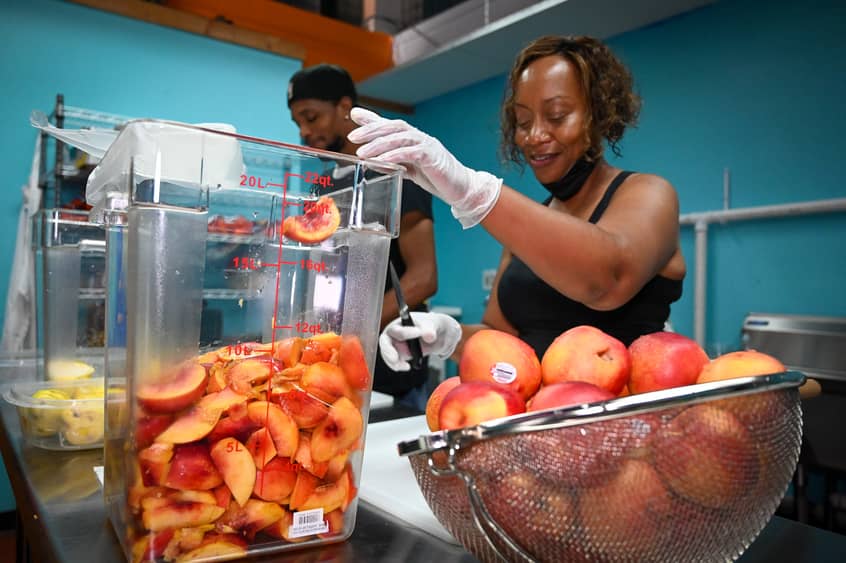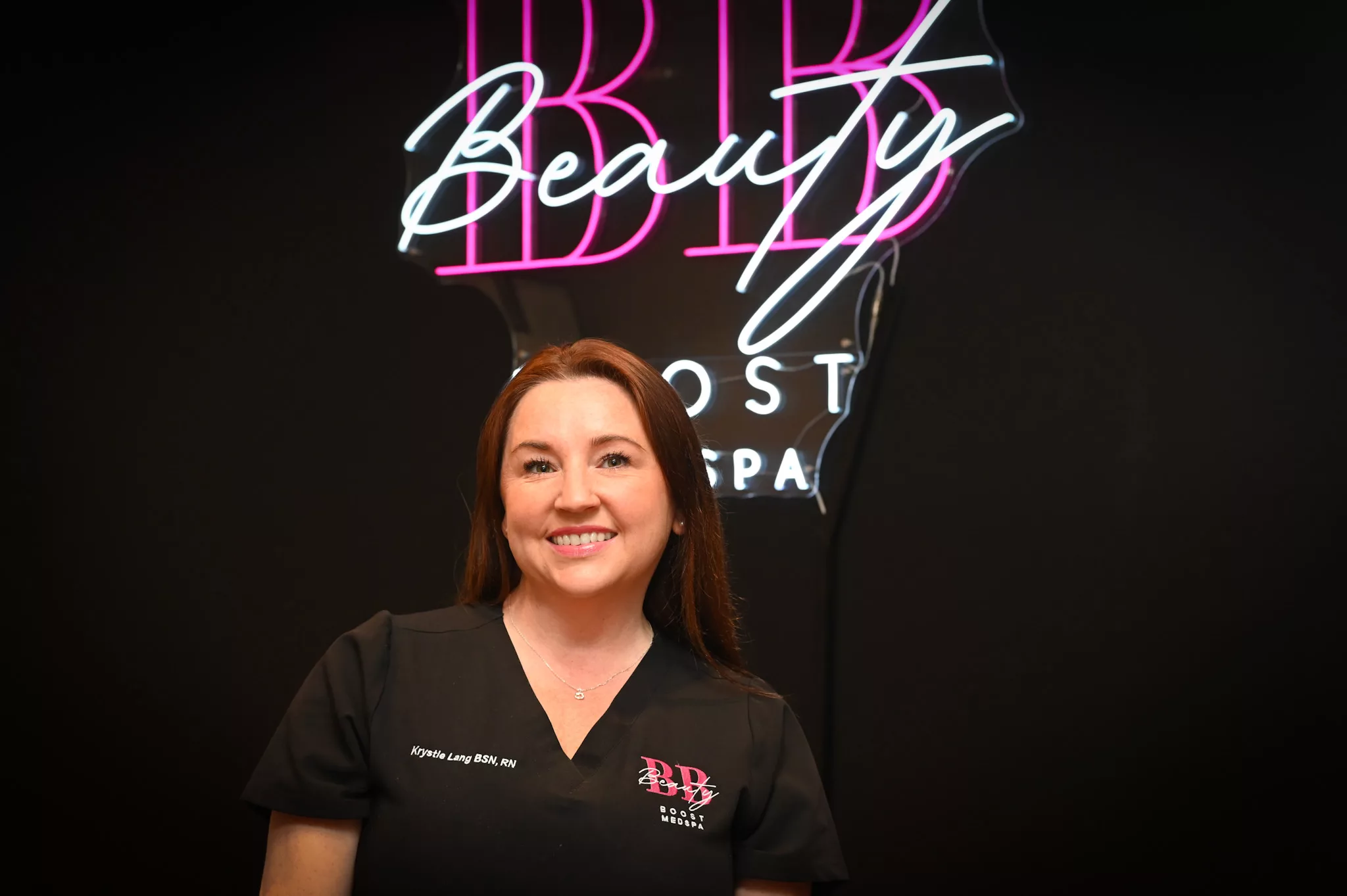 Morgan Bell, the owner of My Cafe Amore, talks with customers on Friday, Aug. 25, 2023, at her shop in downtown Cherry Valley. (Photo by Kevin Haas/Rock River Current)
Morgan Bell, the owner of My Cafe Amore, talks with customers on Friday, Aug. 25, 2023, at her shop in downtown Cherry Valley. (Photo by Kevin Haas/Rock River Current)By Kevin Haas
Rock River Current
Get our mobile app
ROCKFORD — When Morgan Bell first opened her coffee shop in downtown Cherry Valley she would barely sleep.
It wasn’t because of the caffeine.
The 28-year-old entrepreneur was still working full time as a Cherry Valley police officer when she opened My Cafe Amore, 125 E. State St., on May 5. The coffee shop would open at 6 a.m., two hours after her 12-hour police shift ended at 4 a.m.
“I took a two-hour nap in the women’s locker room, and then I would come and work here from 6 a.m. to 2 p.m., take another two-hour nap and then work another 12-hour shift at night,” Bell said. “I did that for another month and a half and it just got to be too much on my own mental health and my physical health.”
Related: This Rockford-area coffee shop serves its dessert-like drinks in bags. Yes, they fit in cupholders
Bell was pushing herself to make a dream of business ownership work. She is among thousands of people in Winnebago County who have taken the leap to start a new business since the pandemic took hold in 2020. Nationally, it’s been called a startup surge, and term holds true locally, too.
The number of business applications taken out in the county surged 125% from 2019 to 2021, when it reached a record high of 3,760. The next year applications declined 16% to 3,131, but that’s still the second highest total on records going back to 2005, according to U.S. Census Bureau data that tracks Employee Identification Number applications to the IRS. We don’t have local-level data for 2023 because that’s only released once a year, but national numbers show that strong business formation continues three yeas after the pandemic.
Not all applications lead to true business formation, but historically there is a close correlation between the number of applications and true business startups, according to the Economic Innovation Group, a bipartisan public policy group centered on the American economy.
“COVID obviously changed the world, but I think it changed the world for people to realize, ‘OK, I have some talents and I don’t know what I’m doing to not exercise those talents,'” Bell said. “Everybody got super creative in their free time.”
There are numerous examples of Winnebago County residents using the pandemic as a jump-start to business ownership.
Take Bill Springer for example. The 46-year-old welder from Machesney Park used a reduction in his hours to start tinkering with growing mushrooms in his garage. Now, his business Iconic Fungi is a staple at local farmers markets and vendor events.
Or Jamar Luster, who was laid off from his manufacturing job in 2020 and started making and selling healthy juices from home with just a blender and a few hundred dollars. Now he’s preparing to move Ripe Life Juice Co. into a new location in downtown Rockford after operating inside Stewart Square for two years. He’s also been featured on national State Farm commercials for evoking the spirit of entrepreneurship.
“Ripe Life has grown bigger than I’ve thought,” Luster said. “I never thought it would be national commercials and meeting people from all over the country about this business.”
More business: PCI Pharma Services building $150M expansion to keep pace with fast growth
The Rock River Current is a startup itself, debuting in fall 2020 and taking its current form in September 2021.
“The number of small businesses definitely grew after the pandemic, and it’s had an impact on our community,” said Francisca French, economic development diversity and procurement coordinator for the city of Rockford. “People were at home, they were thinking about what they wanted to do with their career, what they wanted to do with the rest of their lives, some were leaving their existing jobs and they were doing what they were passionate about.”
 Liz Schaer works in her shop, Rooted, 1408 N. Main St., on Thursday, Aug. 24, 2023, in Rockford. Rooted opened in 2021, a year that saw the most new business startups in Winnebago County on record. (Photo by Kevin Haas/Rock River Current)
Liz Schaer works in her shop, Rooted, 1408 N. Main St., on Thursday, Aug. 24, 2023, in Rockford. Rooted opened in 2021, a year that saw the most new business startups in Winnebago County on record. (Photo by Kevin Haas/Rock River Current)Liz Schaer opened Rooted in December 2021, the biggest year locally and nationally for business formation, after a series of hardships forced her to reexamine what she wanted to do.
She was working as a graphic designer when her father, Dennis, died from cancer in August 2018. About seven months later she was laid off.
She started selling pottery and vintage goods at popups before she bought her own storefront — sight unseen through a government auction — and spent 18 months renovating before opening.
“COVID really affected everybody in more ways than one, which would also include just taking a look at our day-to-day lives,” Schaer said. “It had a big effect on our lives and people decided, ‘I need to do something different.'”
More business: Ripe Life Juice Co. to move into former Rockford Roasting Co. in downtown Rockford
For Schaer, the pandemic afforded her the time to figure out her business plan and make renovations before opening her eclectic shop at 1408 N. Main St. on the city’s North End.
“The living here is so affordable, for makers and creators, artists,” Schaer said. “That’s why we have a strong art scene and would say the same goes for small business.”
Schaer started selling at pop-up markets and out of the former GEM collective space in downtown Rockford before she opened her own store. Other entrepreneurs have taken similar approaches, dipping their toes in by selling online or through vendor markets before taking the next step.
“It’s been great seeing other businesses like Ripe Life, and things that aren’t necessarily restaurants but in that realm, open up and get creative,” Schaer said. “I think there is some creative thinking going on to help us with the rising costs of running a brick-and-mortar business now.”
No signs of slowing
The pandemic jump-started business formation across the country, and the new business activity shows no signs of slowing three years later, according to an analysis by Daniel Newman, research and policy analyst for the Economic Innovation Group.
“How we work has changed. Where we live has changed. Our daily routines have changed, and people are adapting to how these new routines and these new patterns have developed and serving consumer needs,” Newman said in a phone interview.
Through the first half of this year, nationwide applications to start a business that’s likely to hire employees outpaced last year by more than 7%, Newman’s analysis of EIN data showed. If that trend holds, this year’s total in the U.S. will be near 2021’s record amount.
 Karen Gray and Quentin Harris prepare peaches to be squeezed into fresh juice on Thursday, Sept. 16, 2021, at Ripe Life Juice Co., 308 W. State St., Rockford. Gray is owner Jamar Luster’s mother and Harris is a longtime friend. Luster’s business opened in 2021 and moves to a new location in November. (Photo by Kevin Haas/Rock River Current)
Karen Gray and Quentin Harris prepare peaches to be squeezed into fresh juice on Thursday, Sept. 16, 2021, at Ripe Life Juice Co., 308 W. State St., Rockford. Gray is owner Jamar Luster’s mother and Harris is a longtime friend. Luster’s business opened in 2021 and moves to a new location in November. (Photo by Kevin Haas/Rock River Current)Business formation fell both locally and nationally after the Great Recession took hold in 2008. It mostly remained flat until 2020, when the unprecedented surge began.
The growth nationwide has happened in nearly every sector of the economy, from retail and agriculture to real estate and restaurants.
“The increase is extremely broad-based,” Newman said. “Essentially every major industry sector is up significantly relative to our pre-pandemic baseline, which we used the 2019 figures.”
Business startups are just one part of the economic picture, but they can be an important predictor of a healthy economy.
“Small businesses are the largest employer, they are the leading sector of job growth,” Newman said. “It’s been shown through other research that business formation statistics are pretty highly predictive of U.S. payroll employment growth about a year down the road or so.”
The 9-to-5 ‘doesn’t work for me’
Registered Nurse Krystle Lang’s venture into entrepreneurship was inspired in part by the need for flexibility. She opened Beauty Boost Medspa, 6723 Weaver Road, suite 119, last month with Danial Petrie and Elisha Wicklund.
“I am a single mother, I have two toddlers, a 4-year-old and an almost 3-year-old,” Lang said. “Working the 9-to-5, clock-in, clock-out type business, it works for some people, it doesn’t work for me.”
“I’m the sole provider for them and I need to be sure that I’m able to give them everything that they need.”
 Krystle Lang is the co-owner of Beauty Boost Medspa at 6723 Weaver Road, suite 119, in Rockford. Her business opened in August 2023. (Photo by Kevin Haas/Rock River Current)
Krystle Lang is the co-owner of Beauty Boost Medspa at 6723 Weaver Road, suite 119, in Rockford. Her business opened in August 2023. (Photo by Kevin Haas/Rock River Current)Now, the former NICU nurse finds satisfaction in helping people boost their self-esteem with neuromodulators such as botox, dermaplaning and derma fillers. Beauty Boost also offers IV hydration and vitamin therapy.
“I just really like the fact that I can help people feel better about themselves,” Lang said. “If I can subtly change something that they don’t like about themselves and make them feel better than that’s a win for me.”
More news: Real estate investment trust purchases Rockford land under Hard Rock Casino
In August, the national labor force participation rate rose by 0.2 percentage points to 62.8%. That’s still below the prepandemic rate of 63.3% in February 2020. It fell to 60.1% in April 2020, a decrease of more than 8 million people.
Jeffrey Karlberg, an associate professor at the Puri School of Business at Rockford University, said the ease for people to create their own businesses online and from home may contribute to the drop in the labor force.
“When you look at those employment numbers, and people aren’t coming back into the market, they obviously have to do it through creating their own businesses,” Karlberg said. “We saw so many people leave their positions and not going back into the workforce, maybe that’s because they decided to start their own businesses in the online realm.”
Karlberg said growth of online stores such as TikTok Shop have allowed young entrepreneurs to turn profits with minimal startup costs.
“I can’t tell you how many students I have who purchase things off of Alibaba or AliExpress and then resell them through Shopify,” he said. “The cost to enter these markets is minascule.”
He said he encourages all students, even if they’re not pursuing entrepreneurship, to study business.
“I tell my students all the time,” he said. “Even if you’re an art student, come and think about business, because you’re going to have to know about business and this is the time to do it.”
This article is by Kevin Haas. Email him at khaas@rockrivercurrent.com or follow him on X at @KevinMHaas or Instagram @thekevinhaas and Threads @thekevinhaas